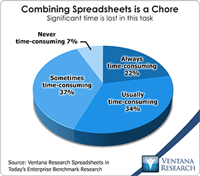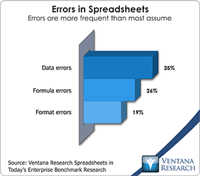I’ve been using electronic spreadsheets for more than 30 years. I consider this technology among the 20th century’s top five most important advances in business management. Spreadsheets have revolutionized every aspect of running any organization. A spreadsheet (specifically, VisiCalc) was the original “killer app” that made business people feel the necessity to buy a personal computer.
Read More
Topics:
Office of Finance,
Operational Performance Management (OPM),
Reporting,
enterprise spreadsheet,
Analytics,
Business Analytics,
Visualization,
Business Performance Management (BPM),
Customer Performance Management (CPM),
Financial Performance Management (FPM),
Information Applications (IA),
Information Management (IM),
Risk,
Sales Performance Management (SPM),
Supply Chain Performance Management (SCPM),
Workforce Performance Management (WPM),
benchmark,
Financial Performance Management
Profit Velocity Solutions’ PV Accelerator is an analytic application designed to enable capital-intensive companies to consistently achieve substantially wider margins and higher return on assets (ROA). Companies in industries such as specialty chemicals, building materials, integrated steel mills and silicon chip fabrication (to name just four) routinely fail to make the right decisions about pricing, production and sales management because they use analytic methods that, from an economic...
Read More
Topics:
Performance Management,
Sales,
Human Capital Management,
Office of Finance,
Operational Performance Management (OPM),
PV Accelerator,
Analytics,
Business Analytics,
Cloud Computing,
Business Performance Management (BPM),
Financial Performance Management (FPM),
Sales Performance Management (SPM),
Supply Chain Performance Management (SCPM),
Price Optimization,
Profit Velocity,
Profitability,
Software,
S&OP
One of the important lessons company executives should have learned over the past 15 years is that it’s dangerous not to do contingency planning, a subject that I’ve written about before. By this I mean real, think-outside-the-box contingency planning (not just extrapolating), which is especially important when doing long-range planning. The past decade or so has been punctuated by periods of elevated volatility in financial and product markets, and there’s a good probability it will occur...
Read More
Topics:
Big Data,
Planning,
Office of Finance,
Reporting,
Budgeting,
contingency,
currency,
driver-based,
Business Analytics,
Business Performance Management (BPM),
Financial Performance Management (FPM),
Financial Performance Management,
Integrated Business Planning
Read More
Topics:
Office of Finance,
extended close,
US-GAAP,
XBRL,
Analytics,
Governance, Risk & Compliance (GRC),
Business Performance Management (BPM),
CFO,
compliance,
Financial Performance Management (FPM),
financial reporting,
SEC,
Digital Technology
IBM this week announced its pending acquisition of the Star Analytics product portfolio. Star Analytics is a privately held company that offers products designed to provide easy access to and integration with Oracle Hyperion data sources. While Star Analytics has a good product and solid references, it has lacked critical mass to support more effective sales and marketing efforts. Star Analytics’ strategic value to IBM lies in its ability to unlock data held in Oracle Essbase multidimensional...
Read More
Topics:
Reporting,
closing,
Essbase,
Hyperion,
Analytics,
Business Analytics,
Business Collaboration,
Data Integration,
IBM,
Oracle,
Business Performance Management (BPM),
Financial Performance Management (FPM),
Information Management (IM),
Financial Performance Management,
Star Analytics,
TM1
The electronic spreadsheet is among the top five most important advances in business management to come along in the last hundred years. It revolutionized almost all aspects of running an organization. It was the original “killer app” that made it necessary for people to go out and buy a personal computer. Yet our recent benchmark research project Spreadsheet Use in Today’s Enterprise confirmed advice we have been giving for the past decade: Spreadsheets are a fabulous tool but they have...
Read More
Topics:
Office of Finance,
Reporting,
enterprise spreadsheet,
Analytics,
Business Analytics,
Visualization,
Business Performance Management (BPM),
Financial Performance Management (FPM),
Risk,
benchmark,
Financial Performance Management
Taxes – both indirect (sales or value added taxes, for example) and direct (income taxes) – are one the largest expense items on the corporate income statement. In recent years it has become common for large and even midsize companies to automate their indirect tax management process, but direct tax management has remained a bastion of manual processes built on a heap of desktop spreadsheets. In previous blog posts I discussed this issue and the role of the tax data warehouse as a necessary...
Read More
Topics:
ERP,
GRC,
Office of Finance,
audit,
finance transformation,
Tax,
Analytics,
Business Analytics,
Governance, Risk & Compliance (GRC),
Business Performance Management (BPM),
CFO,
Financial Performance Management (FPM),
Information Management (IM),
Vertex,
FPM












